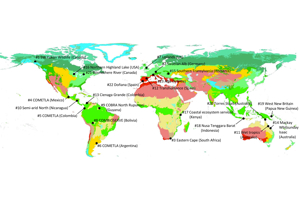Large conferences can be an ideal setting to meet other people with shared research interests and more often now when the conference ends the dialogue continues. Such was the case with a group of researchers who met at the 2014 Resilience conference in Montpellier, France to share their experiences conducting participatory scenarios as part of their research projects. An initial core group grew to include researchers involved with 23 case studies using a participatory scenario planning approach. Now the results of their discussions and comparative analysis have been published as part of a special feature on Programme on Ecosystem Change and Society (PECS): Knowledge for Sustainable Stewardship in Social-ecological systems in Ecology & Society.
The systematic comparison of the 23 participatory scenario planning (PSP) cases offered several key insights into lessons learned as well as some of the challenges with this methodological approach. In addition to a large variety of scenario outputs that help communicate findings to diverse groups of stakeholders, the process of creating scenarios was valuable in and of itself and contributed to increasing dialogue, resolving conflicts, encouraging complexity thinking and legitimacy in decision making.
Full citation:
Oteros-Rozas, E., B. Martín-López, T. Daw, E. L. Bohensky, J. Butler, R. Hill, J. Martin-Ortega, A. Quinlan, F. Ravera, I. Ruiz-
Mallén, M. Thyresson, J. Mistry, I. Palomo, G. D. Peterson, T. Plieninger, K. A. Waylen, D. Beach, I. C. Bohnet, M. Hamann, J.
Hanspach, K. Hubacek, S. Lavorel and S. Vilardy 2015. Participatory scenario planning in place-based social-ecological research:
insights and experiences from 23 case studies. Ecology and Society 20(4):32. http://dx.doi.org/10.5751/ES-07985-200432

Keywords: scenarios, participatory scenarios, case study comparison, PECS